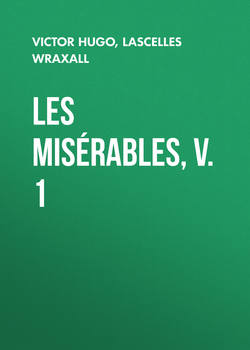Читать книгу Les Misérables, v. 1 - Victor Hugo, Clara Inés Bravo Villarreal - Страница 6
BOOK I
A JUST MAN
CHAPTER V
MONSEIGNEUR'S CASSOCKS LAST TOO LONG
ОглавлениеM. Myriel's domestic life was full of the same thoughts as his public life. To any one who could inspect it closely, the voluntary poverty in which the Bishop lived would have been a solemn and charming spectacle. Like all old men, and like most thinkers, he slept little, but that short sleep was deep. In the morning he remained in contemplation for an hour, and then read mass either at the cathedral or in his house. Mass over, he breakfasted on rye bread dipped in the milk of his own cows. Then he set to work.
A bishop is a very busy man. He must daily receive the secretary to the bishopric, who is generally a canon, and almost every day his grand vicars. He has congregations to control, permissions to grant, a whole ecclesiastical library to examine, in the shape of diocesan catechisms, books of hours, etc.; mandates to write, sermons to authorize, curés and mayors to reconcile, a clerical correspondence, an administrative correspondence, on one side the State, on the other the Holy See; in a word, a thousand tasks. The time which these thousand tasks, his offices, and his breviary left him, he gave first to the needy, the sick, and the afflicted; the time which the afflicted, the sick, and the needy left him he gave to work. Sometimes he hoed in his garden, at others he read and wrote. He had only one name for both sorts of labor, he called them gardening. "The mind is a garden," he would say.
Toward mid-day, when the weather was fine, he went out and walked in the country or the town, frequently entering the cottages. He could be seen walking alone in deep thought, looking down, leaning on his long cane, dressed in his violet wadded and warm great coat, with his violet stockings thrust into clumsy shoes, and wearing his flat hat, through each corner of which were passed three golden acorns as tassels. It was a festival wherever he appeared, it seemed as if his passing had something warming and luminous about it; old men and children came to the door to greet the Bishop as they did the sun. He blessed them and they blessed him, and his house was pointed out to anybody who was in want of anything. Now and then he stopped, spoke to the little boys and girls, and smiled on their mothers. He visited the poor so long as he had any money; when he had none he visited the rich. As he made his cassocks last a long time, and he did not wish the fact to be noticed, he never went into town save in his wadded violet coat. This was rather tiresome in summer.
On returning home he dined. The dinner resembled the breakfast. At half-past eight in the evening he supped with his sister, Madame Magloire standing behind them and waiting on them. Nothing could be more frugal than this meal; but if the Bishop had a curé to supper, Madame Magloire would take advantage of it to serve Monseigneur with some excellent fish from the lake, or famous game from the mountain. Every curé was the excuse for a good meal, and the Bishop held his tongue. On other occasions his repast only consisted of vegetables boiled in water and soup made with oil. Hence it was said in the town: "When the Bishop does not fare like a curé he fares like a trappist."
After supper he conversed for half an hour with Mlle. Baptistine and Madame Magloire; then he returned to his room and began writing again, either on loose leaves or on the margin of some folio. He was well read, and a bit of a savant, and has left five or six curious MSS. on theological subjects, among others a dissertation on the verse from Genesis, "In the beginning the Spirit of God moved upon the face of the waters." He compared this verse with three texts, – the Arabic, which says, "The winds of God breathed;" Flavius Josephus, who said, "A wind from on high fell upon the earth;" and lastly the Chaldaic of Onkelos, "A wind coming from God breathed on the face of the waters." In another dissertation he examines the works of Hugo, Bishop of Ptolemaïs, great-grand-uncle of him who writes this book, and he proves that to this bishop must be attributed the various opuscules published in the last century under the pseudonym of Barleycourt. At times, in the midst of his reading, no matter what book he held in his hands, he would suddenly fall into a deep meditation, from which he only emerged to write a few lines on the pages of the book. These lines have frequently no connection with the book that contains them. We have before us a note written by him on the margin of a quarto entitled, "Correspondence of Lord Germain with Generals Clinton and Cornwallis, and the Admirals of the American Station. Versailles, Prinçot; and Paris, Pissot, Quai des Augustins." Here is the note.
"O thou who art! Ecclesiastes calls you Omnipotence; the Maccabees call you Creator; the Epistle to the Ephesians calls you Liberty; Baruch calls you Immensity; the Psalms call you Wisdom and Truth; St. John calls you Light; the Book of Kings calls you Lord; Exodus calls you Providence; Leviticus, Holiness; Esdras, Justice; Creation calls you God; man calls you the Father; but Solomon calls you Mercy, and that is the fairest of all your names."
About nine o'clock the two females withdrew and went up to their bed-rooms on the first floor, leaving him alone till morning on the ground floor. Here it is necessary that we should give an exact idea of the Bishop's residence.
